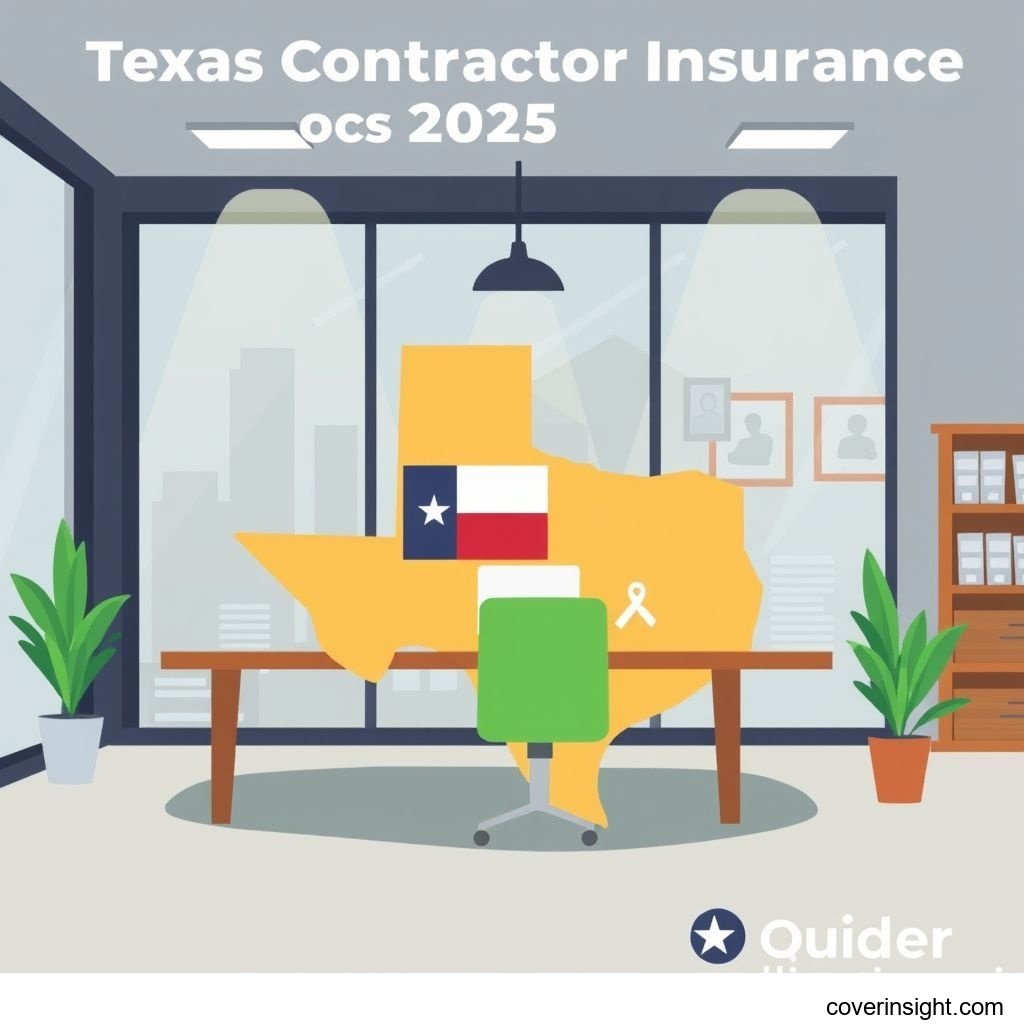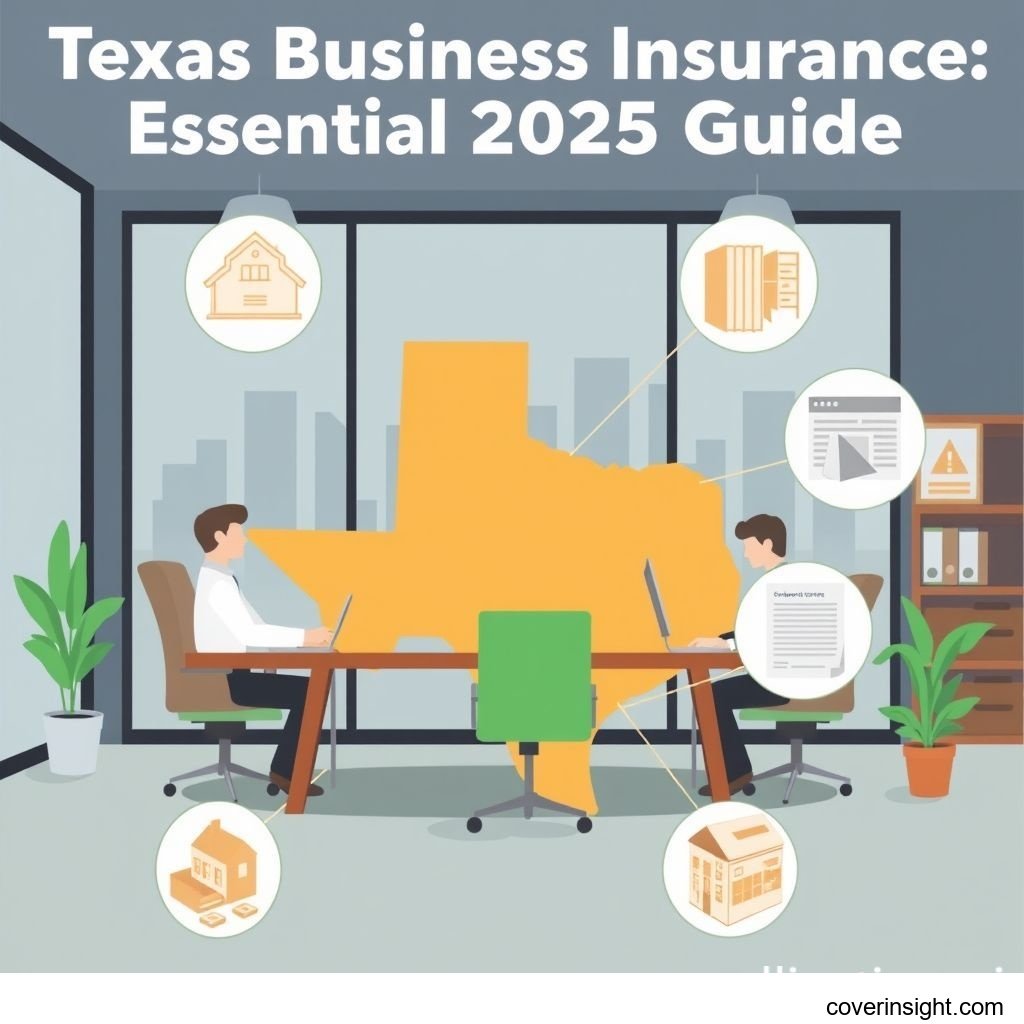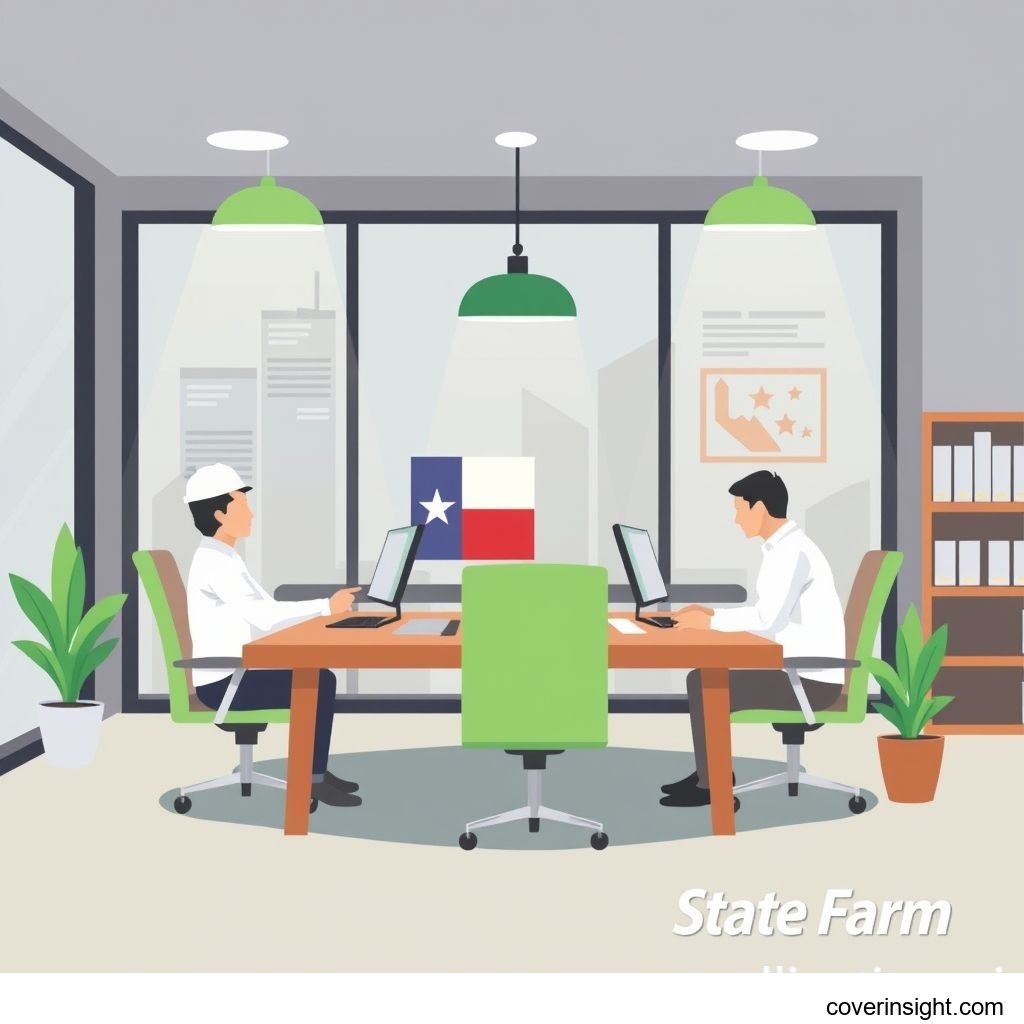Introduction
As Texas continues its robust growth, the construction industry thrives, bringing both immense opportunities and significant risks for contractors. Operating in the Lone Star State demands not only skill and dedication but also comprehensive protection. For 2025, ensuring your business is adequately insured is not just a best practice; it's a necessity for stability and compliance. A reliable insurance partner like statefarm stands as a cornerstone for countless businesses across the U.S., offering tailored solutions for diverse needs. Understanding the essential coverages and how to secure them effectively will be paramount for Texas contractors navigating the year ahead. This guide will delve into the critical aspects of contractor insurance, focusing on the options and advantages that a provider like statefarm can offer.
Understanding Key Texas Contractor Insurance Coverages with State Farm
Every contractor's business is unique, but certain foundational insurance policies are universally critical. From safeguarding against accidental damage to protecting your team and assets, having the right blend of coverage is non-negotiable. Statefarm offers a comprehensive suite of policies designed to meet the specific demands of the Texas contracting landscape.
General Liability: The Foundation
General Liability (GL) insurance is arguably the most vital policy for any contractor. It protects your business from third-party claims of bodily injury, property damage, and personal injury arising from your operations. Imagine a scenario where a visitor trips over equipment at your job site, or a stray nail from your work causes damage to a client's property. Without robust general liability coverage from a provider like statefarm, these incidents could lead to devastating financial losses. It covers legal defense costs, settlements, and judgments, allowing your business to continue operating even after an unforeseen event.
Workers' Compensation: Protecting Your Team
For most Texas contractors with employees, Workers' Compensation insurance is a statutory requirement, although Texas is unique in allowing some businesses to opt-out, it's highly recommended. This crucial coverage provides medical benefits and wage replacement for employees who suffer work-related injuries or illnesses. It not only protects your employees but also shields your business from costly lawsuits arising from workplace accidents. Statefarm helps ensure that your team is cared for, maintaining morale and productivity while complying with crucial state guidelines. Learn more about the general landscape of U.S. insurance at US Insurance Home.
Commercial Auto Insurance: On the Road
If your business utilizes vehicles for transporting tools, equipment, or personnel, Commercial Auto insurance is indispensable. A personal auto policy simply won't cut it for business-related incidents. This policy covers vehicles owned by your business, providing protection against accidents, theft, and damages. Given the extensive travel often required for Texas contractors, ensuring your fleet is properly covered by a trusted insurer like statefarm means peace of mind on every journey, whether you're heading to Houston or El Paso.
Professional Liability and E&O insurance for consultants
While not traditionally seen as a primary need for all contractors, Professional Liability insurance, often known as Errors and Omissions (E&O) insurance for consultants, is becoming increasingly important, especially for those offering design-build services, project management, or specialized consulting. This policy protects you from claims of negligence, errors, or omissions in the professional services you provide. For instance, if a design flaw in your blueprint leads to structural issues, or advice you provided results in financial loss for a client, E&O insurance for consultants would respond. Many construction consultants and specialized contractors find this coverage essential to mitigate risks associated with professional advice and services. Understanding E&O insurance for consultants can be complex, but its value is clear for specific business models.
BOP insurance explained for Comprehensive Protection
A Business Owner's Policy (BOP) is an excellent option for many small to medium-sized contractors. A BOP insurance explained simply is a package policy that combines General Liability insurance, commercial property insurance, and often business interruption coverage into a single, convenient policy. This integrated approach can be more cost-effective than purchasing individual policies, simplifying your insurance management. For instance, if your workshop is damaged by fire, a BOP insurance explained would cover the damage to your property and the loss of income while you rebuild. Statefarm provides flexible BOP options that can be customized to fit your specific business size and needs, offering comprehensive protection in one tidy package. This streamlined approach allows contractors to manage their policies with greater ease.
Coverage Details for Texas Contractors
Understanding the breadth and limitations of your contractor's insurance policies is crucial for effective risk management. While statefarm aims to provide comprehensive solutions, knowing exactly what's included and what's typically excluded helps in making informed decisions.
What’s Included
A typical contractor's insurance package from statefarm may include a variety of coverages tailored to construction-related risks. Key inclusions often are:
-
Third-Party Bodily Injury: Covers medical expenses and legal fees if someone is injured on your job site or due to your work.
-
Third-Party Property Damage: Protects against damage to clients' property or third-party property caused by your operations.
-
Advertising Injury: Covers claims like libel, slander, or copyright infringement arising from your advertising.
-
Completed Operations: Insures against claims that arise after your work is finished and the project is handed over.
-
Employer's Liability: Part of Workers' Compensation, it protects you from lawsuits if an employee sues you over a work-related injury.
-
Commercial Property Coverage: Protects your owned office, workshop, tools, and equipment against perils like fire, theft, and vandalism.
-
Business Interruption: Replaces lost income if you can't operate due to covered property damage.
-
Tools and Equipment Coverage: Protects your valuable machinery and tools, whether on-site, in transit, or in storage.
Common Exclusions
While comprehensive, no insurance policy covers every conceivable event. It's important to be aware of common exclusions that might not be covered by your statefarm policy, necessitating additional endorsements or separate policies:
-
Intentional Acts: Damage or injury resulting from deliberate actions are almost never covered.
-
Faulty Workmanship: While property damage caused by faulty workmanship might be covered by GL, the cost to repair the faulty work itself is typically excluded.
-
Pollution Liability: Environmental damage or pollution incidents usually require specialized environmental liability insurance.
-
Professional Services Errors: As noted, this typically requires specific E&O insurance for consultants.
-
Employee Injuries (outside Workers' Comp): Unless specifically covered by Workers' Compensation, general liability often excludes employee injuries.
-
Punitive Damages: Some policies may exclude coverage for punitive damages awarded in lawsuits.
-
Wear and Tear: Gradual deterioration or maintenance issues are not covered by property insurance.
Always review your specific policy documents from statefarm or any insurer carefully to understand your precise coverage limits and exclusions.
Cost Analysis of State Farm Contractor Policies
The cost of contractor insurance, whether from statefarm or another provider, is a significant consideration for any business owner. Premiums are not one-size-fits-all; they are determined by a multitude of factors unique to your operation.
Price Factors
Several elements influence the price you'll pay for your statefarm contractor insurance:
-
Type of Contracting Work: Roofing, demolition, and excavation are generally considered higher risk than, say, interior painting or light carpentry, leading to higher premiums.
-
Location: Insurance costs vary by state and even by city due to local regulations, claim frequency, and regional risks (e.g., severe weather in Texas).
-
Years in Business & Experience: Newer businesses may face higher rates until they establish a claim-free history. Experienced contractors often benefit from lower premiums.
-
Claims History: A history of frequent claims will invariably lead to higher premiums. Maintaining a good claims record is crucial.
-
Number of Employees: More employees mean higher exposure for Workers' Compensation and potentially higher general liability premiums.
-
Payroll Size: Workers' Compensation premiums are directly tied to your total payroll.
-
Gross Annual Revenue: Higher revenue often correlates with larger projects and greater exposure, impacting general liability and property insurance costs.
-
Coverage Limits & Deductibles: Choosing higher coverage limits (e.g., $2 million instead of $1 million) will increase premiums. Opting for a higher deductible can lower your premium, but you'll pay more out-of-pocket if a claim occurs.
-
Safety Protocols: Implementing robust safety programs and training can sometimes lead to discounts from insurers like statefarm.
Saving Tips
Reducing your insurance costs without compromising essential coverage is achievable with strategic planning:
-
Bundle Policies: As discussed with BOP insurance explained, purchasing multiple policies from statefarm (e.g., general liability, commercial auto, property) can often result in a multi-policy discount.
-
Implement Safety Measures: A strong safety program reduces the likelihood of claims, which can lead to lower premiums over time. Insurers often look favorably on businesses committed to safety.
-
Increase Deductibles: If you have the financial capacity to absorb a larger out-of-pocket expense in the event of a claim, increasing your deductible can lower your annual premium.
-
Regularly Review Your Coverage: As your business evolves, your insurance needs change. Periodically review your policies with your statefarm agent to ensure you're not over-insured or under-insured.
-
Maintain a Clean Claims History: This is perhaps the most impactful tip. Fewer claims mean lower risk in the eyes of insurers, translating to better rates.
-
Shop Around (with caution): While loyalty to an insurer like statefarm offers benefits, it’s always wise to get quotes from different providers periodically to ensure you're getting competitive rates.
Why State Farm is a Leading Choice for Texas Contractors
Choosing an insurance provider is a significant decision for any contractor. Statefarm has established itself as a frontrunner in the insurance industry, offering compelling reasons for Texas contractors to consider their services.
State Farm's Reputation and Support
Statefarm boasts a long-standing reputation for financial stability and customer service. Their extensive network of local agents means you can often find personalized support right in your community, which is invaluable for busy contractors. These agents can offer guidance specific to Texas regulations and the unique risks of your trade. From understanding the nuances of professional liability to securing robust BOP insurance explained, local statefarm agents are equipped to help. They provide accessible and responsive support, whether you're inquiring about E&O insurance for consultants or navigating a complex claim. This local presence combined with a national backbone provides a reassuring blend of personalized care and robust resources, making statefarm a strong partner for your business insurance needs. For broader industry insights, you can consult resources like the National Association of Insurance Commissioners.
Navigating the Application Process and Claims with State Farm
Securing the right insurance and understanding how to leverage it when needed are two sides of the same coin. Statefarm aims to make both processes as straightforward as possible for contractors.
Applying for State Farm Coverage
The application process for contractor insurance with statefarm typically involves a few key steps:
-
Initial Consultation: Reach out to a local statefarm agent. They will discuss your business type, the services you offer, your revenue, number of employees, and risk exposures.
-
Information Gathering: You'll need to provide detailed information about your operations, including your years in business, safety records, claims history, and specific needs like E&O insurance for consultants or comprehensive BOP insurance explained.
-
Quote Generation: Based on the provided information, the agent will generate customized quotes for the recommended policies, such as General Liability, Workers' Compensation, Commercial Auto, and a Business Owner's Policy.
-
Policy Customization: This is where you work with the agent to adjust coverage limits, deductibles, and add any necessary endorsements to perfectly fit your business needs and budget.
-
Policy Issuance: Once you accept the terms, your policies will be issued, providing you with the necessary certificates of insurance.
This collaborative approach ensures that your statefarm coverage is truly tailored to your Texas contracting business.
Handling Claims with State Farm
When an unfortunate event occurs, a smooth claims process is paramount. Statefarm emphasizes efficiency and support during these times:
-
Prompt Reporting: Report any incident that could lead to a claim to your statefarm agent as soon as possible. Provide all available details, including date, time, location, parties involved, and any witnesses.
-
Documentation: Gather all relevant documentation, such as photos, videos, incident reports, police reports (if applicable), and medical records.
-
Claim Adjustment: A statefarm claims adjuster will be assigned to your case. They will investigate the incident, assess damages, and determine coverage based on your policy terms.
-
Resolution: Once the investigation is complete, statefarm will process the claim, covering eligible expenses, repairs, or settlements according to your policy limits.
-
Ongoing Support: Your statefarm agent can act as a valuable liaison throughout the claims process, answering questions and providing updates.
A well-defined process for handling claims helps contractors minimize disruption and focus on getting back to work quickly. Further state-specific insurance guidance can often be found via State Insurance Departments.
FAQs about Texas Contractor Insurance
Here are some frequently asked questions about obtaining and managing contractor insurance in Texas, specifically considering options with statefarm:
-
How much does statefarm cost?
The cost of statefarm contractor insurance varies significantly. It depends on factors like your trade, location in Texas, business size, number of employees, annual revenue, claims history, and the specific types and limits of coverage you choose. A small, low-risk carpentry business might pay a few hundred dollars a month, while a large, high-risk general contractor could pay several thousand. Getting a customized quote from a statefarm agent is the best way to determine your exact cost.
-
What affects premiums?
Premiums for contractor insurance are influenced by several key factors. These include your industry (e.g., roofing is higher risk than landscaping), the services you provide (e.g., requiring E&O insurance for consultants increases costs), your location, gross receipts, total payroll, past claims history, the number of years you've been in business, and the specific coverage limits and deductibles you select. Your commitment to safety practices can also positively impact your rates with statefarm.
-
Is it mandatory?
In Texas, General Liability insurance is generally not legally mandated for all contractors at the state level, though many clients and municipalities will require it. Workers' Compensation is mandatory for most employers with employees, although Texas does have a unique "non-subscriber" option for some businesses. Commercial auto insurance is required if you use vehicles for business and need to comply with state financial responsibility laws. For specific project requirements, clients often stipulate minimum insurance coverages regardless of state law.
-
How to choose?
Choosing the right contractor insurance involves assessing your unique risks, understanding state requirements, and comparing quotes. Consider your trade, client demands, employee count, and the value of your equipment. Look for an insurer like statefarm that offers a comprehensive suite of products, including a robust BOP insurance explained, and provides excellent customer service. Compare not just prices but also coverage limits, exclusions, and the insurer's reputation for claims handling. Consulting with an experienced statefarm agent can help tailor a package that fits your specific needs.
-
Consequences of no coverage?
Operating without proper contractor insurance in Texas can lead to severe consequences. You could face crippling financial liabilities from lawsuits due to accidents, injuries, or property damage. Without Workers' Compensation, you'd be directly responsible for employee medical bills and lost wages. Many clients will refuse to hire uninsured contractors, limiting your business opportunities. Additionally, you may face fines or legal penalties depending on the type of insurance missing and specific regulations. Adequate coverage from a reputable provider like statefarm protects your business's financial health and reputation.








Comments